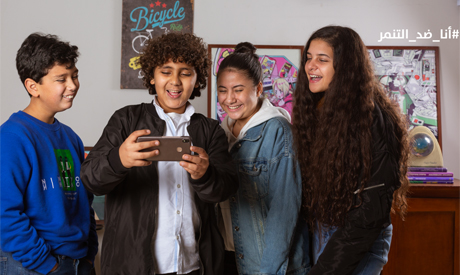
Safer Internet Campaign in Egypt : courtesy of UNICEF
This year marks the 30th anniversary of the Convention of the Rights of the Child (CRC) which put on the international map the commitment to the protection and rights of children worldwide.
Three decades also passed since the world was changed forever by the Internet which influenced the way we receive information and had not only numerous positive impacts, but also posed massive challenges.
On 11 February, Egypt joined the world in marking the Safer Internet Day, taking part in endeavours to make the web a safer place for children by addressing challenges and threats, on top of which are cyberbullying and exposure to abuse and harmful content.
On this occasion, a joint statement by UNICEF and the National Council for Childhood and Motherhood (NCCM) was issued to launch the Safer Internet campaign.
“The NCCM is committed to continue raising awareness about ending violence against children, including that which may occur in familiar settings, such as homes and schools," NCCM Secretary-General Azza El-Ashmawy said.
The campaign which uses the hashtags #SaferInternet and #ImAgainstBullying stresses the importance of protecting children and adolescents in the cyberspace as well, where exposure to violence is exasperated by the nature of online content being accessible indefinitely as well as by lack of both adult and child awareness about Internet risks.
Bruno Maes, UNICEF representative in Cairo pointed out that it is the collective responsibility of governments, international and national organisations, the private sector, families and caregivers to eliminate these risks and to increase children’s access to safe and quality online content.
In 2017, Egyptian statistics revealed that 14 percent of children in rural areas and 34 percent of children in urban areas use the Internet regularly, mainly social media that increase the hazards of cyberbullying.
Tarek Shawky, the minister of education and technical education, stated “the ministry spares no effort towards the holistic development of adolescents, especially at the early stages when children’s characters are being development and their social behaviour formed. The ministry is extremely mindful of all negative social behaviours such as sexual harassment and bullying, and ensures penalising those proven to commit such acts, noting that there are social workers in schools who are qualified to deal with these cases.
“With the expansion of digital access, and the increasing presence of children and adolescents online, they are becoming more prone to this kind of negative behaviour," he added.
The Safer Internet campaign was launched on the digital platforms of the NCCM, the education ministry, UNICEF and the EU, providing informative content for two weeks on the subject.
Short link: